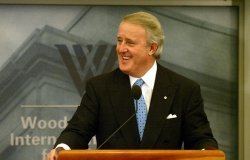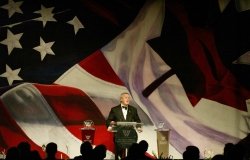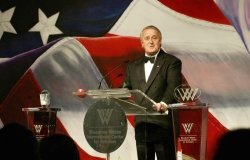<i>Transforming Leadership: The Pursuit of Happiness</i>
Overview
Author James MacGregor Burns, Woodrow Wilson Professor of Government Emeritus, Williams College; commentator, Georgia Sorenson, Jepson School of Leadership, University of Richmond
James MacGregor Burns, founder of the discipline of leadership studies, came to the Wilson Center to discuss his most recent book on the subject in a two-hour meeting and in an interview with the Center's radio program, dialogue.
Leadership is "transforming," Burns told the meeting, when it accomplishes change that is both planned and enduring. Perhaps the greatest leadership experience of the United States, if not the entire West, occurred at the time of the American Revolution. The founding fathers accomplished a revolution without post-war retributive violence, wrote a constitution, established the institutions of government, enacted the Bill of Rights and, with the election of 1800, made a peaceful transition to a two-party system. "The people involved were luminous," Burns declared, "but as a group, not just as individuals. Theirs was a collective leadership."
The factor most critical to their success, and to successful leadership in general, Burns asserted, was the soundness of their fundamental public values: "life, liberty, and the pursuit of happiness." The third value, happiness, meant far more than self-gratification; it implied both self-realization and equality. Burns postulated a hierarchy of good in leadership, with the lowest level being virtue; the next, ethics; the highest, public values. Transforming leadership, guided by public values, contrasts with what he labeled transactional leadership, which is governed by ethics and enables us to negotiate the daily life transactions experienced by families, workplaces, etc. Strong transactional leadership is a necessary but insufficient element of great political leadership, which can be achieved even in the absence of virtue and ethics. Roosevelt, Burns' prime example, was neither virtuous, in that he was unfaithful to his wife, nor ethical, in that he manipulated and lied. "Yet we honor him," Burns said, "because of the great public values he fought for, as eloquently expressed in the four freedoms." That scarcely implies that Roosevelt was perfect; his greatest lapse, Burns suggested, was endorsement of relocation camps for Japanese-Americans, which violated the public values he espoused. Woodrow Wilson also displayed transforming, value-guided leadership, though he was thwarted by "rabid opposition" to his League of Nations plan.
The element that Burns considers "radically different" from other theories of leadership is his insistence that great leadership entails transforming followers into leaders themselves. He wrote the Epilogue to Transforming Leadership in order to test his own theory by applying it to the pressing concrete problem of global poverty. "Part of their poverty is a lack of understanding of what can be done," Burns said about poor people. "These people cannot lift themselves by their bootstraps, because they have no bootstraps." Burns therefore proposes launching a worldwide program in which volunteers would be sent to underdeveloped areas where, instead of imposing their views about how to alleviate poverty, they would listen to the concerns of the impoverished. The volunteer would then help local people learn about the help that is available to them and, ultimately, develop an indigenous leadership that would remain in place long after the volunteers' departure. "If terrorists can go into other regions and discover potential leaders so dedicated that they will sacrifice their own lives for a cause," he asked, "can't we identify leaders to work for life, liberty, and the pursuit of happiness?"
Georgia Sorenson and Burns discussed the public values, in addition to those advanced by the founding fathers, that should guide leaders today. Burns mentioned environmentalism, and Sorenson commented that in today's world, ideas can serve as leaders. Regarding Burns' plans for alleviating world poverty, the two commented that while most Americans feel a "vague compassion for the poor," they do not know what to do with it; strong leadership is needed to translate these goals into action. "What is the point of leadership," Sorenson asked, "unless it is a tool to accomplish something greater?"
Philippa Strum, Director of U.S. Studies (202) 691-4129
Thank you for your interest in this event. Please send any feedback or questions to our Events staff.










